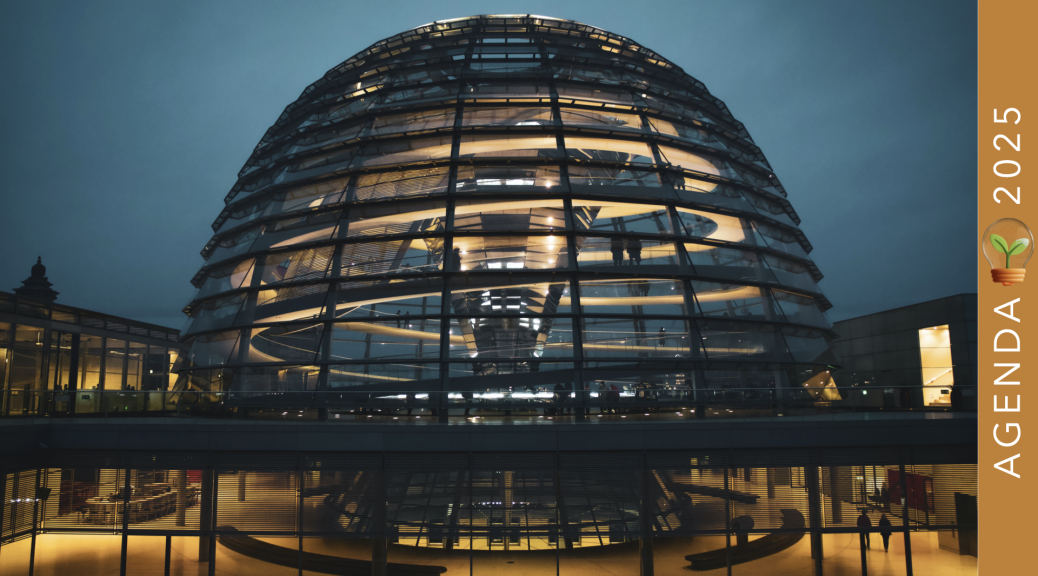
AGENDA 2025: From Ministerial Authorisation to Parliamentary Authorisation?
This article is part of the D’Kart Spotlights: AGENDA 2025, in which experts from academia and practice comment on aspects of the Competition Policy Agenda presented by the Federal Ministry of Economic Affairs and Climate Action (BMWK). The contributions already published can be found here.
Part of the competition policy agenda of the Ministry for Economic Affairs and Climate Action (BMWK) until 2025 is the participation of the Bundestag in the ministerial authorisation procedure. Maximilian Konrad took a closer look at this project for D’Kart.
“Corrupt behaviour at the highest level”, “Appointment to positions according to party affiliation [Parteibuchwirtschaft]”, ”Nepotism”
“Corrupt behavior at the highest level”, “Appointment to positions according to party affiliation [Parteibuchwirtschaft]”, “Nepotism”
German Bundestag, Plenary Transcript 15/40 from 10 April 2003, 2388.
These were the words used by the opposition in the German Bundestag to describe the transfer of Federal Minister for Economic Affairs and Energy Werner Müller to the energy industry following the E.on/Ruhrgas ministerial authorisation. In retrospect, this ministerial authorisation cemented energy dependency on Russia instead of the actually intended securing of energy supply. With the competition policy Agenda 2025, the Bundestag shall now no longer only be a forum for criticism post factum, but shall already be involved in the procedure of the ministerial authorisation. But first let us take a step back.
The Ministerial Authorisation – a recapitulation
The ministerial authorisation (§ 42 of the Act against Restraints of Competition (GWB)) enables the Federal Minister for Economic Affairs to clear a merger prohibited by the Bundeskartellamt [Federal Cartel Office] if the restraints of competition identified by the Bundeskartellamt are outweighed by macroeconomic benefits or an overriding interest of the general public – in short, the common good. In the event that the ministerial authorisation is granted, there will certainly be a restriction of competition as the guarantor of prosperity and freedom in the social market economy.
It is noteworthy that the ministerial authorisation is explicitly not a political decision. The Federal Minister for Economic Affairs acts as a politically neutral cartel authority under § 48 (1) GWB. The ministerial authorisation is a decision bound by law which must be granted if there is a public interest overriding the restraints of competition.
Pursuant to § 42 (5) GWB, an opinion of the Monopolkommission [Monopolies Commission], an independent advisory body of economic and legal experts, must be obtained before the ministerial authorisation is granted. Since the 9th amendment of the GWB, any deviation from its vote must be justified separately by the minister. However, a look at the past shows that the minister has never had any inhibitions about overriding the Monopolkommission.
Although the ministerial authorisation has only been applied for 23 times and granted 10 times since its introduction in 1973 (most recently Miba/Zollern 2019), it has become a game changer in the especially rare cases of a merger prohibition by the Bundeskartellamt: for example, the ministerial authorisation has fundamentally changed the defence sector (Daimler/MBB 1989), the energy sector (VEBA/Gelsenberg 1974, VEBA/BP 1978, E.on/Ruhrgas 2002) and the food retailing sector (Edeka/Tengelmann 2016). An economic ex-post analysis has shown that the public interest objectives pursued with the ministerial authorisation have hardly ever been achieved (Stöhr/Budzinski, WuW 2019, 508).

The crux of the ministerial authorisation: the common good
The core requirement of ministerial authorisation is the common good. Still, the definition of this constituent element is unclear. Even the “state, economic or socio-political reasons” mentioned in the explanatory memorandum are so broad that they are ultimately meaningless.
The practice therefore helps itself with a casuistry of reasons for the common good that have been recognised in the past. This casuistry is as diverse as the history of ministerial authorisation and ranges from securing energy supplies, relieving the burden on public budgets, safeguarding jobs or protecting the climate and environment to press diversity.
The shortcoming of this casuistry is that it can neither replace the balancing act between the common good and the protection of competition, nor is it consistent. What has once been recognised as a common good is no longer recognised as such just a few years later, and vice versa.
The common good in a pluralistic society
This difficulty in defining the concept of the common good is rooted in the structure of modern and pluralistic society, in which a multitude of conceptions of the common good coexist and compete with each other.
Especially in the particularly controversial ministerial authorisation procedures of the past – such as Daimler/MBB (1989), E.on/Ruhrgas (2002) or Edeka/Tengelmann (2016) – these competing conceptions of the common good clashed in public with full force: each side put forward a multitude of arguments and experts in support of its position and at the same time accused the other side of betraying the common good.
This rift went right through society, sometimes right through political parties, without there being an Archimedean point from which the Federal Minister for Economic Affairs could have judged the correctness of the arguments.
Therefore, the assumption was regularly voiced that in this unclear decision-making situation, ultimately extraneous political aspects, and not the common good, had tipped the scales in favour of the minister’s decision. For example, the initiation of the merger by the minister (Daimler/MBB), the influence of well-organised interest groups (the union Verdi at Edeka/Tengelmann, energy industry at E.on/Ruhrgas) or the minister’s career (“saviour gesture” at Edeka/Tengelmann, “corporate blacksmith” at Daimler/MBB) were decisive.
The Bundestag as a forum for the formation of public opinion
In view of the public controversies surrounding ministerial authorisation, it is only natural to include the Bundestag as the centre of political and democratic debate in the ministerial authorisation procedure.
One of the proposals discussed in the past is the introduction of a debate in the Bundestag before the ministerial authorisation is granted, combined with an optional vote by the Bundestag, which the Federal Minister for Economic Affairs can only override with the consent of the Federal Government.
This proposal would have the advantage that conflicting opinions and positions in the Bundestag could crystallise in speech and counter-speech. The various options for the minister would become clear. At the same time, the publicity associated with a Bundestag debate would reduce the risk of backroom deals.
Nevertheless, even the optional vote of the Bundestag cannot solve the core problem of defining the common good, since there is still a lack of criteria for determining whether a decision corresponds to party-political interests or the common good. The risk of influence by extraneous aspects would be reduced, but would remain despite the increased transparency.
Moreover, it is unlikely that the governing parties would block a project of the Federal Minister for Economic Affairs who is part of their government, especially since the Federal Minister for Economic Affairs, with the backing of the federal government, could override a veto by the Bundestag. Ultimately this reform proposal therefore does little to change the central problems of ministerial authorisation.
The crucial question: parliamentary authorisation instead of ministerial authorisation?
Despite all the assurances that the ministerial authorisation is formally a strictly objective decision by the minister as cartel authority (§ 48 (1) GWB), it is therefore time to face reality and accept that the ministerial authorisation is in fact a highly political decision.
From this realisation it is only a small step to parliamentary authorisation. For as paradoxical as this may seem at first glance, it is precisely the open politicisation of ministerial authorisation by the transfer of the decision-making authority to the Bundestag that offers the potential to align the parliamentary authorisation with the common good instead of party interests.
However, the decisive condition for a parliamentary authorisation to be aligned with the common good is the requirement of a two-thirds majority instead of a simple majority, which would make the parliamentary authorisation subject to the logrolling of the governing parties.

Competition as the constitution of the social market economy
The requirement of a two-thirds majority alone guarantees the cross-party consensus on the existence of public welfare reasons that is necessary to legitimise an exception to the principle of competition as the constitution of the social market economy.
By transferring the decision-making power to the Bundestag, the ministerial authorisation would be made the subject of a public weighing of political interests, which would at the same time be tied back to the common good by the requirement of a two-thirds majority. In the literature on legal and political theory, it has long been recognised that the common good can at best be determined by a public and discourse-based consensus.
Separation of powers and the common good
The main argument against parliamentary authorisation is the associated disruption of the separation of powers. Through parliamentary authorisation, the legislature would override a decision of the executive branch. Formally, this could be mitigated by the Federal Minister for Economic Affairs continuing to make the formal decision with a resolution of the Bundestag with a two-thirds majority as prerequisite. In this way, the separation of powers could improve the alignment of the ministerial authorisation with the common good.
As long as there is no consensus to abolish the ministerial authorisation despite all the bad decisions of the past, it is therefore advisable to place this dangerous instrument in the hands of the Bundestag and to link it to the high obstacle of a two-thirds majority in order to prevent party-political abuse. Even in this case, however, the well-known risk remains, that a ministerial or parliamentary authorisation is neither suitable nor essential to achieve the desired public welfare goals.
Compared to the status quo, a transfer of the decision-making authority to the Bundestag, combined with the requirement of a two-thirds majority, would nevertheless be a considerable step forward.

Dr Maximilian Konrad, MSc (LSE) is an associate in a law firm specialising in intellectual property law in Munich and an independent lawyer in Frankfurt a.M. and Munich. His dissertation on “The Common Good, Public Opinion and Ministerial Approval under Merger Law” was awarded several prizes.